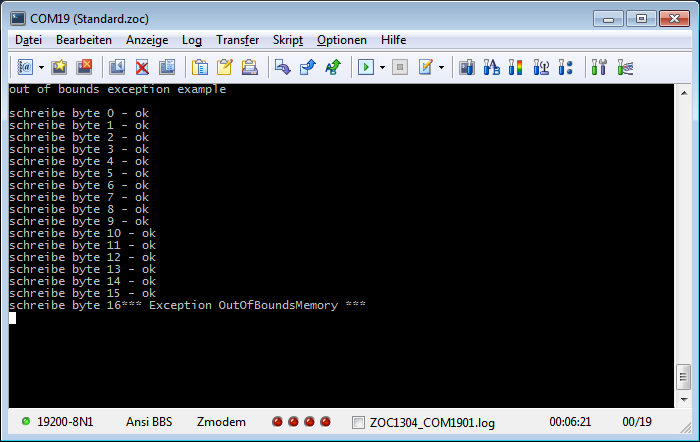Detect memory violations
Luna enables dynamic use of memory objects in RAM. The memory objects in memory are strings and memory blocks.
See also: Memory Management
In order to see whether data of the active memory objects are not damaged, an appropriate monitoring functionality via exceptions is implemented in Luna. By means of such monitoring may mistake as buffer overflows, accesses via object boundaries, and lack of memory are detected. See also: exceptions With the exceptions OutOfBoundsMemory and NilObjectException accesses via memory limits or not generated memory objects are detected.
Example
We generate a memory block and write data into it. If now tries outside the memory block to be written by a programming error in the data memory, this triggers the exception OutOfBoundsMemory. Since omitted for performance reasons without implementation of the exceptions, the monitoring functions, this can lead to damage to the internal memory structure and thus to be cascading serious program errors. The exception allows here to find such memory violations.
const F_CPU=20000000 avr.device = atmega328p avr.clock = F_CPU avr.stack = 32 uart.baud = 19200 uart.recv.enable uart.send.enable dim i as byte dim m as MemoryBlock print 12;"out of bounds exception example" print 'Memory block to allocate 16 bytes of memory m = New MemoryBlock(16) 'Check whether the memory block could be allocated if m<>nil then 'Write to the memory via a loop. Outside the 'Storage capacity of the allocated memory block is the 'exception thrown. for i=0 to 20 print "schreibe byte ";str(i); m.ByteValue(i)=i print " - ok" next else print "Error: memory block could not be allocated " end if do loop exception OutOfBoundsMemory ' Output error message Print "*** exception OutOfBoundsMemory ***" endexception
